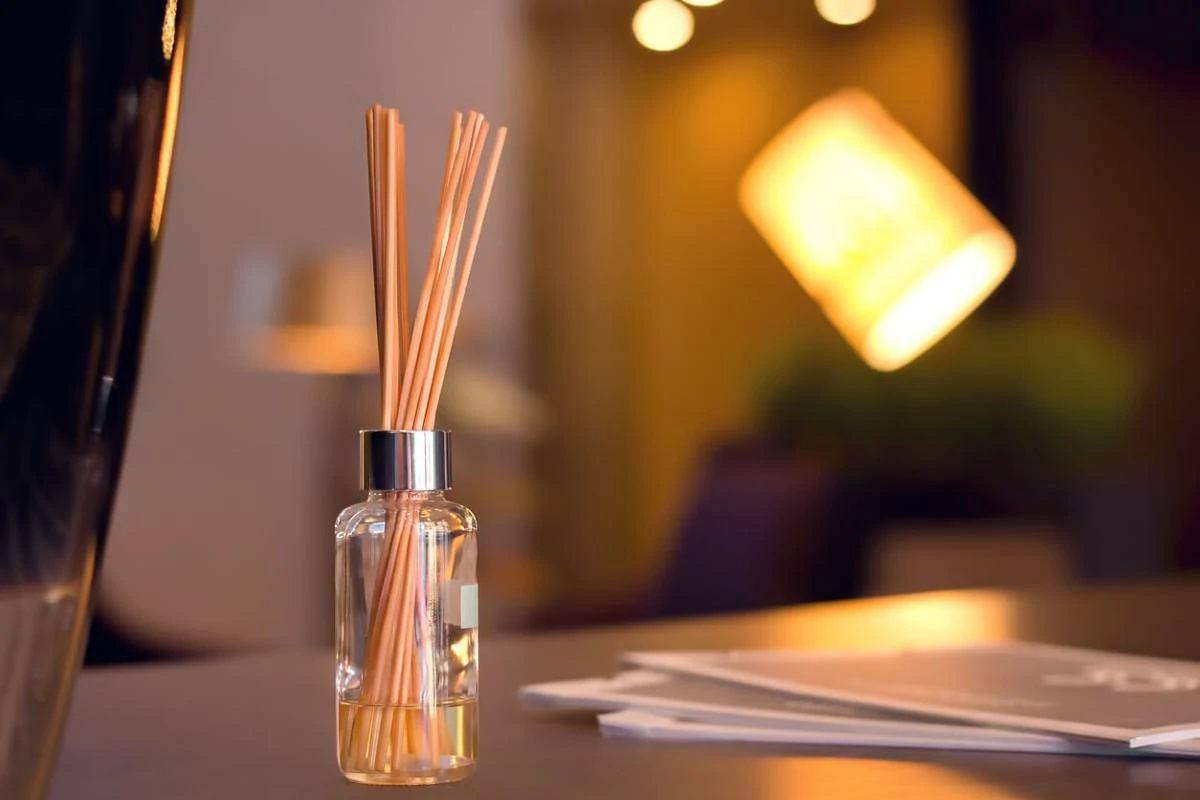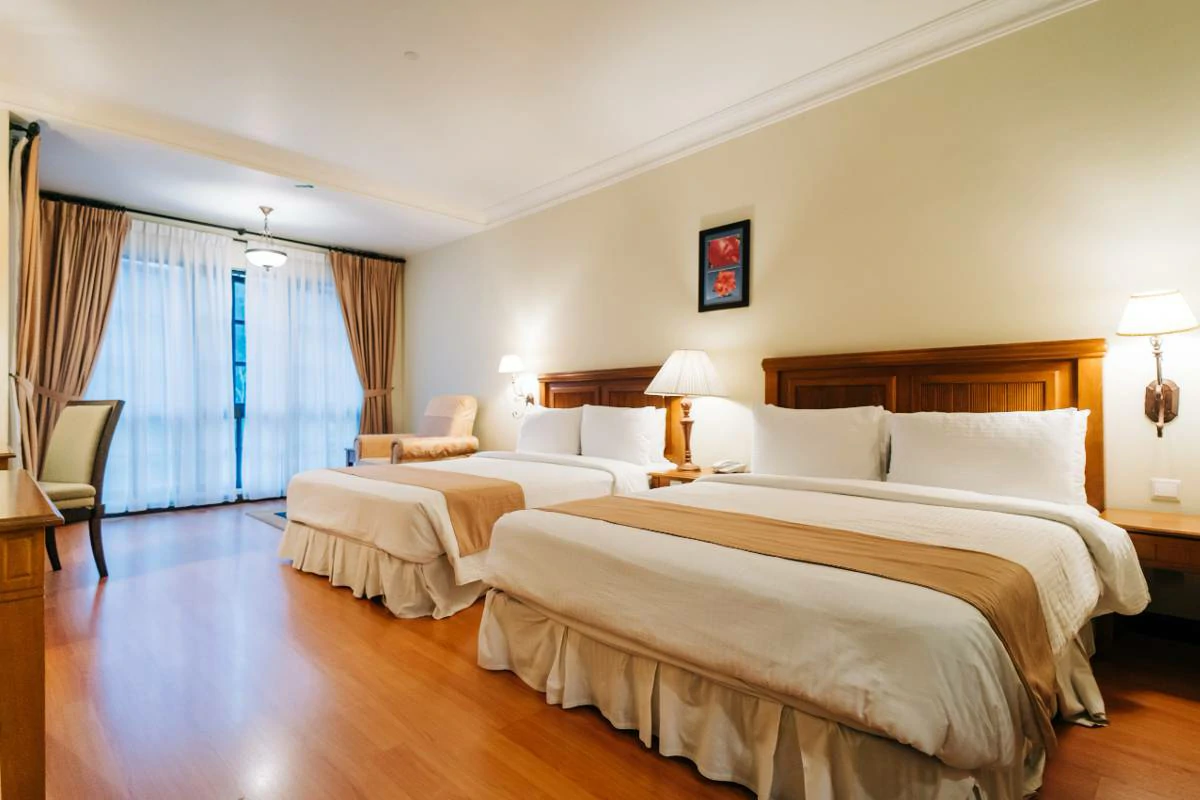Why do hotels smell so good? Answer is – Hotels often smell so good because they use a combination of techniques to create a welcoming and memorable atmosphere. This includes strategic scent diffusers with signature fragrances designed to evoke positive emotions, the use of high-quality cleaning products, fresh linens and towels, and sometimes even subtle air freshening in rooms and common areas. The overall goal is to create a sense of luxury, cleanliness, and relaxation for guests.
Summary
- Hotels invest in creating unique signature scents to enhance the guest experience.
- Scent diffusers strategically distribute pleasant aromas throughout lobbies and common areas.
- High-quality, scented cleaning products leave subtle, fresh notes behind.
- Cleanliness is paramount, and hotels ensure fresh linens, towels, and overall pristine spaces.
- Hotels sometimes subtly scent individual rooms to create a sense of luxury.
Why Do Hotels Smell So Good?

The Power of Scent and Guest Experience
Scent possesses an extraordinary ability to evoke memories, emotions, and a sense of place. It has the power to transport us to a sun-drenched beach, a cozy cabin fire, or the warmth of freshly baked bread. Hotels understand this deeply, and they meticulously curate the scentscapes within their walls to create a welcoming ambiance and lasting impression on guests.
Our sense of smell is directly linked to the limbic system of the brain – the area responsible for processing emotions and memories. This explains why a whiff of a certain perfume can instantly transport you back to a childhood summer, or why the smell of a holiday spice blend always fills you with seasonal cheer.
Dr. Alan Hirsch, founder of the Smell & Taste Treatment and Research Foundation in Chicago, notes that “odors have a greater impact on long-term memory and emotional response than any of the other senses.”
Why a Hotel’s Smell Matters
In the hospitality industry, scent plays a crucial role in shaping a guest’s overall experience. A well-chosen fragrance can do more than just mask unpleasant odors; it can create a unique identity for a hotel, enhance the perception of luxury and comfort, and trigger positive associations that encourage guests to return.
Here’s a deeper look into why hotels invest heavily in their signature scents:
Establishing a Brand Identity: Think of how the scent of freshly baked cookies instantly reminds you of a Westin Hotel, or the way a subtle white-tea fragrance creates a sense of tranquility associated with many luxury hotel chains. Scent branding allows hotels to differentiate themselves from the competition and create a multi-sensory experience that engages guests on a deeper level.
Fostering a Sense of Relaxation: Imagine walking into a hotel lobby after a long flight and being greeted by a calming scent of lavender or eucalyptus. Such fragrances have been proven to reduce stress and anxiety, promoting a sense of well-being and putting guests instantly at ease.
Elevating the Perception of Cleanliness: Beyond simply smelling pleasant, the right hotel scent can also reinforce the idea of a pristine and hygienic environment. Crisp, citrusy notes or subtle linen-like fragrances subconsciously signal cleanliness and freshness, leaving guests with a positive impression.
Creating a Memorable Experience: A hotel’s scent has the power to linger in a guest’s memory long after they’ve checked out. Recalling a pleasant fragrance can trigger fond memories of a vacation, encouraging repeat visits or word-of-mouth recommendations.
Signature Scents and Scent Marketing

1. What is Scent Branding?
Scent branding, also known as olfactory branding, is a powerful marketing strategy that uses strategically designed fragrances to create a distinctive brand identity and forge emotional connections with customers.
In the hospitality industry, scent branding involves crafting a unique fragrance that becomes synonymous with a specific hotel or hotel chain.
This signature scent is then carefully diffused throughout the hotel’s spaces to shape the guest experience, evoking feelings of luxury, comfort, or excitement.
2. How Hotels Select Their Signature Scents
The process of selecting a signature hotel scent is both an art and a science. Hotels often collaborate with fragrance specialists or scent marketing companies to develop a custom fragrance that aligns with their brand image and target audience.
Here’s how the selection process typically unfolds:
Brand Analysis: Fragrance experts begin by understanding the hotel’s personality, values, and the type of experience it wants to offer its guests. Is the hotel sleek and modern, or does it exude a more traditional, cozy charm?
Target Audience: Determining the hotel’s ideal guest demographic plays a crucial role in scent selection. A younger, trend-conscious clientele might gravitate towards bolder fragrances, while a more mature guests could favor classic, calming scents.
Desired Emotions: Hotels carefully consider the mood they wish to create with their scent. They might aim to evoke relaxation, rejuvenation, sophistication, or a sense of adventure, depending on their brand.
Scent Development: Scent specialists work closely with hotels to create a bespoke fragrance that embodies the desired emotions and brand identity. This often involves testing and refining the fragrance over time.
3. Popular Notes in Hotel Fragrances
While hotel scents can be incredibly diverse, certain fragrance notes tend to be popular choices due to their ability to elicit specific emotions and create a sense of luxury:
Citrus: Zesty lemon, grapefruit, or bergamot bring freshness, energy, and evoke a sense of cleanliness.
White Tea: A delicate, calming scent that promotes relaxation and tranquility.
Florals: Notes like jasmine, lavender, or rose can be used to create a romantic, soothing, or sophisticated ambiance.
Woodsy: Sandalwood, cedarwood, or other woodsy notes provide warmth, earthiness, and a touch of grounding comfort.
Linen: Evokes a subtle, fresh scent associated with luxurious bedding and towels.
4. Scent Diffuser Technology in Hotels
To ensure their signature scent is consistently and effectively distributed, hotels rely on various scent diffuser technologies:
HVAC Integration: Larger hotels often integrate scent diffusers directly into their HVAC (Heating, Ventilation, and Air Conditioning) systems. This allows for subtle scent diffusion throughout lobbies, hallways, and other common areas.
Nebulizing Diffusers: These diffusers break down fragrance oils into a fine mist for targeted room scenting. They offer greater control over scent intensity and are often used in individual guest rooms or smaller spaces.
Reed Diffusers: A simple and elegant option, reed diffusers offer a more subtle scent throw. These are frequently used in hotel bathrooms or smaller lounge areas.
Sarah Peterson Expert Opinion
“Scent branding is increasingly becoming an essential component of the guest experience in the hospitality industry. A well-chosen fragrance can transport guests to a state of relaxation, leave a lasting impression, and become a signature element guests associate with the hotel brand,” says Sarah Peterson, founder of a boutique scent marketing firm specializing in hotels.
The Importance of Cleanliness

While a hotel’s signature scent undoubtedly plays a significant role in the overall ambiance, it’s important to remember that true freshness can’t be faked.
A meticulously clean environment is the foundation upon which a pleasant hotel scent is built.
Even the most luxurious fragrance can’t fully mask the presence of lingering odors or give an impression of a less-than-hygienic space.
1. High-Quality Cleaning Products and Their Role
Hotels invest in top-of-the-line cleaning products that not only effectively eliminate dirt and grime but also leave behind subtle, pleasant scents.
These products often contain notes that complement a hotel’s signature fragrance, enhancing the overall olfactory experience.
Hotels often opt for professional-grade cleaning solutions with these key qualities:
Subtle Fragrance: Many commercial cleaning products contain fresh-smelling fragrance notes like linen, citrus, or subtle florals. These scents gently linger in the air after cleaning.
Odor elimination: Beyond simply smelling nice, quality cleaning products neutralize unpleasant odors, ensuring rooms and common areas always smell fresh.
Eco-friendliness: Many hotels are now opting for environmentally-conscious cleaning products that are not only effective but also safe for guests and the planet.
2. The Scent of Fresh Linens and Towels
There’s something undeniably comforting and luxurious about the scent of crisp, freshly laundered hotel linens and towels.
Hotels ensure the highest laundry standards to achieve that pristine scent that signals cleanliness and care.
Here’s what contributes to that signature “freshly laundered” scent:
High-Quality Detergents & Fabric Softeners: Hotels use commercial-grade detergents specifically designed for high-volume laundry. These detergents often have subtle but pleasant fragrance profiles.
Professional Laundering Processes: Industrial-sized machines and specialized drying techniques ensure linens are thoroughly cleaned and retain freshness.
Meticulous Folding and Storage: Properly folded and stored linens help maintain that crisp, clean scent by preventing mustiness.
3. Hotel Cleaning Standards and Freshness
Hotels adhere to rigorous cleaning standards to ensure every guest experience begins with a fresh and inviting space. These standards often involve:
Daily Housekeeping: Guest rooms are meticulously cleaned each day, including changing bed linens, towels, vacuuming, disinfecting surfaces, and replenishing toiletries.
Thorough Deep Cleaning: Hotels have regular deep cleaning schedules for items like carpets, upholstery, and drapes to eliminate any trapped odors and maintain overall freshness.
Attention to Detail: Housekeeping staff are trained to pay attention to even the smallest details, like dusting every corner and ensuring all surfaces are spotless.
Emily Thompson Expert Opinion
“Cleanliness is not just about appearances – it’s about creating a truly hospitable environment. A clean hotel signals to guests that their well-being and comfort are a top priority.” – Emily Thompson, Hotel Operations Manager with over 15 years of experience.
Creating a Luxurious Ambiance

While signature scent diffusers play a crucial role in curating a hotel’s olfactory experience, a few extra touches can elevate the sense of luxury and create a truly unforgettable ambiance.
1. Subtle Room Freshening Techniques
Beyond the initial impression created by a signature fragrance in common areas, hotels often subtly scent individual guest rooms to reinforce the overall feeling of freshness and attention to detail. Here are some techniques they employ:
Light Room Sprays: Housekeeping might use a light, fragrance-infused room spray after cleaning and before guest arrival. These sprays offer a subtle burst of scent that complements the hotel’s signature fragrance.
Scented Amenities: Providing guests with luxurious bath products (soaps, shampoos, lotions) infused with the hotel’s signature scent reinforces the brand experience and allows guests to take a bit of the fragrance home with them.
Turn-Down Service Delights: In some luxury hotels, turndown service may involve leaving a small scented candle, a sprig of lavender on the pillow, or a light spritz of room spray as a final touch that delights guests.
2. Additional Elements That Contribute to a Good-Smelling Hotel
A hotel’s ambiance is created through a combination of sensory elements that work in harmony. Here’s how other design and hospitality details can enhance and influence the olfactory experience:
Fresh Flowers: Strategically placed floral arrangements in lobbies or common areas not only add visual beauty but also contribute to a fresh and inviting aroma. Hotels often choose floral bouquets with subtle, complementary scents.
Natural Elements: Incorporating natural materials like wood, stone, or luxurious fabrics can create a sense of warmth and complement a hotel’s scent profile. Think of how a lobby with a grand stone fireplace feels more comforting when filled with a subtle woodsy fragrance.
Lighting: Soft, warm lighting not only creates a cozy atmosphere but can also enhance certain fragrance notes. For example, warm lighting accentuates the comforting qualities of vanilla or woodsy scents.
Cleanliness (Again!): It’s worth reiterating that a meticulously cleaned space provides the perfect canvas for a pleasant hotel scent. No matter how beautiful the decor or how expensive the fragrance diffuser, true freshness always starts with impeccable cleanliness.
James Keller Expert Opinion
“A thoughtfully curated hotel scent should never be overpowering. It should work subtly with other design elements and meticulous hospitality practices to create a holistic sense of luxury and well-being,” – James Keller, Interior Designer specializing in high-end hospitality spaces.
How to Recreate the Hotel Scent Experience at Home

While you may not be able to perfectly replicate the complex scent systems used by hotels, there are several ways to capture that essence of clean luxury and transform your home into a scented sanctuary.
1. Products to Achieve a “Hotel Scent”
Diffusers: There are a variety of diffusers available to suit all budgets and spaces:
- Nebulizing Diffusers: These break down essential or fragrance oils into a fine mist for powerful scent dispersion.
- Ultrasonic Diffusers: These use water and essential oils, providing both fragrance and a touch of humidity.
- Reed Diffusers: A simple, passive option that’s ideal for smaller spaces or those who prefer subtle fragrance.
Candles: Luxury scented candles offer a beautiful ambiance and a pleasant fragrance. Choose candles made from soy or beeswax with high-quality fragrance oils. Check out retailers like Bath & Body Works or local boutiques specializing in candles.
Room Sprays: A quick and easy way to refresh spaces. Look for room sprays with subtle notes reminiscent of hotel fragrances. Many fragrance companies offer these, like Nest Fragrances.
Scented Linens: Invest in high-quality bed sheets, towels, and consider lightly scented linen sprays for an extra touch of hotel luxury.
Fragrance Selection
Focus on scents popular in hotels:
- Clean & Fresh: Crisp linen, white tea, subtle citrus.
- Relaxing: Lavender, eucalyptus, chamomile.
- Warm & Cozy: Vanilla, sandalwood, light spice blends.
2. Tips for Keeping Your Home Smelling Fresh and Inviting
Prioritize Cleaning: A clean home is the best base for a good scent. Regular dusting, vacuuming, and cleaning surfaces are essential.
Open Windows: Air things out! Even a few minutes of fresh air daily makes a noticeable difference.
Bake Something Delicious: The scent of fresh-baked cookies or bread is naturally warm and inviting.
Simmer Pots: Gently simmer citrus peels, herbs like rosemary, and spices like cinnamon on your stovetop for a DIY room fragrance.
Indoor Plants: Not only do they beautify your space, but many indoor plants help purify the air naturally.
Take Care of Pet Areas: Regular cleaning of litter boxes, pet beds, and any pet-related items is key to maintaining freshness.
Address Odor Sources: Be sure to regularly tackle the trash, empty fridge shelves of expired food, and keep drains clean to avoid unpleasant lingering odors.
Lisa Thompson Expert Opinion
“Transforming your home’s scent is not about overwhelming the space with fragrance. It’s about using subtle scents strategically, combined with good cleaning practices, to create a consistently welcoming atmosphere,” says Lisa Thompson, founder of a home organization and cleaning services company.
Conclusion
The scent of a hotel is more than just a pleasant aroma – it’s a carefully orchestrated sensory experience designed to evoke feelings of comfort, luxury, and create lasting brand loyalty.
Hotels employ a combination of signature scent diffusing, meticulous cleaning practices, and luxurious details to shape a unique olfactory identity that leaves a lasting impression on guests.
By understanding the strategies used by hotels and incorporating some of their techniques, you can elevate the ambiance of your own home.
With the right products, a focus on freshness, and attention to detail, it’s possible to transform your space into an inviting sanctuary that reminds you of the luxurious comforts of a hotel stay.
FAQs
Q: Can I get the same scent used by my favorite hotel?
While some hotels release their signature fragrances for purchase, many keep them exclusive to their properties. However, you can find fragrances with similar scent profiles (citrusy, floral, etc.) that evoke a similar feeling of luxury. Scent specialists or fragrance retailers may be able to assist with finding close matches.
Q: Are the fragrances used in hotels safe?
Reputable hotels use fragrances that adhere to safety standards set by organizations like the International Fragrance Association (IFRA). If you’re using essential oils or fragrance diffusers at home, always choose high-quality products and use them with moderation, especially in the presence of pets or children.
Q: I’m sensitive to strong scents. Can I still enjoy the hotel scent experience?
Absolutely! Opt for subtle fragrance options like reed diffusers or light room sprays. Natural scents from fresh flowers, simmered citrus, or a sprig of lavender can be a gentle alternative. Prioritize cleanliness to create a fresh-smelling environment without overwhelming fragrance.
Q: Are there any natural ways to improve my home’s scent?
Yes! Open your windows for fresh air, use baking soda to absorb odors, simmer pots with aromatic herbs or spices, and incorporate indoor plants that help purify the air naturally.







